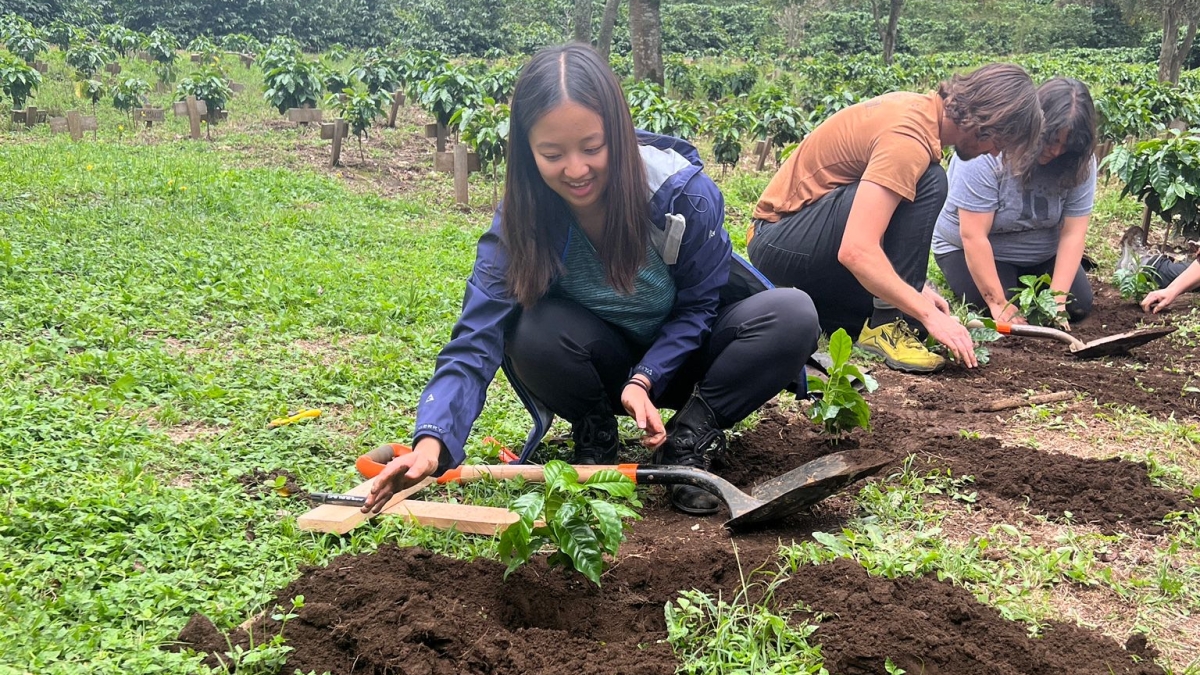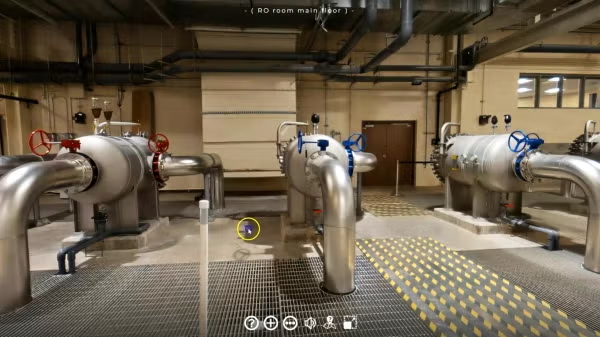ASU student contributes to sustainability practices at Starbucks coffee farm in Costa Rica

ASU supply chain management and business major Emily Wong helped plant coffee trees at Hacienda Alsacia, the Starbucks coffee farm in Costa Rica. Photo courtesy Emily Wong
When Arizona State University student Emily Wong first arrived at Hacienda Alsacia, the Starbucks coffee farm in Costa Rica, the vivid beauty of the place struck her as unbelievable.
“The first morning we drove up to Hacienda Alsacia, I had just one thought in my mind: This is unreal," Wong said of the lush, emerald-green landscape capped by a cerulean sky with billowy white clouds that she described as something out of National Geographic.
Wong, a junior double majoring in supply chain management and business (global politics) was one of five ASU students who traveled to Costa Rica this fall to participate in an ASU and Starbucks program focusing on agriculture, sustainability and resilience at the coffee company’s global agronomy research and development headquarters, Hacienda Alsacia, a 593-acre farm located on the slopes of Poás Volcano, less than an hour from the country’s capital city, San Jose.
The trip evolved out of a project Starbucks announced last June to develop a sustainability learning and innovation lab at Hacienda Alsacia, with ASU working with the company to offer educational programming for students and Starbucks partners (employees).
The lab is expected to open within the next three years and serve as a center for education and research surrounding some of the most pressing issues facing the coffee industry, including climate change, pest control, plant disease and water scarcity.
“Creating educational content for students through an interdisciplinary and sustainability lens is a high priority for this initiative,” said Lauren Bataska, program manager at the ASU Global Institute of Sustainability and Innovation.
“One of our goals is to be as inclusive as possible and reach the maximum number of learners, so we decided to take a unique approach to creating educational content by incorporating a diverse group of students from different educational backgrounds to help co-design some of the content and programming,” she said.
Colleges across ASU were asked to nominate students for the program. Seventy nominations were submitted. Wong, a junior in Barrett, The Honors College at ASU, was nominated by the honors college.
Students with varied backgrounds, ranging from undergraduates to doctoral students majoring in supply chain, social policy, community advocacy and sustainability were selected for the program, Bataska said.
Including current students in content creation will help define key learning objectives and strengthen the program by focusing on topics that matter to students now and in the future, she added.
Wong said she was especially excited to be a part of the program and delve deeper into Starbucks sustainability initiatives, which she had heard about at a Supply Chain Management Association Innovation Conference last spring.
“I felt grateful and honored to be representing ASU as one of just five student ambassadors for this pilot program. Each of us brought diverse backgrounds and areas of expertise to the table. I was able to contribute supply chain and general business knowledge,” she said.
Wong said much of her time at Hacienda Alsacia was spent observing the coffee production process, touring high-yield plots and nurseries, and speaking with Starbucks director of global agronomy and Hacienda Alsacia’s general manager about agricultural issues and farm operations.
“The program was focused on collecting information and discussing current challenges and solutions to issues driven by climate change, like coffee leaf rust and earlier harvest seasons, with key stakeholders, including Starbucks partners at Hacienda Alsacia and external farms in the region,” she said.
She saw hundreds of different, cross-bred species of coffee trees that were engineered to be resistant to leaf rust, a fungus that reduces the photosynthesis in leaves, causing them to drop prematurely and damage the trees. She helped plant young coffee trees in Esperanza “Hope” Field — so named by the farm’s general manager, whose mother’s name was Esperanza.
Wong also learned about Costa Rica’s current shortage of potable water, which will affect agricultural industry irrigation practices, and worked on developing educational module content on Hacienda Alsacia for ASU courses.
“In most of my classes, sustainability is taught more as a concept rather than something tangible, so it was great to learn directly from coffee experts about the production process as well as current challenges and initiatives they are taking on,” Wong said.
Wong said she would highly recommend the program to other students.
“This program is an incredible opportunity, particularly for research and/or an honors thesis, and to directly impact and engage with a real community in a foreign country. It’s also a way to immerse oneself in a new culture,” she said.
According to Bataska, new student programs involving ASU and Starbucks will be announced in 2024.
More Environment and sustainability

2 ASU faculty elected as AAAS Fellows
Two outstanding Arizona State University faculty spanning the physical sciences, psychological sciences and science policy have…

Homes for songbirds: Protecting Lucy’s warblers in the urban desert
Each spring, tiny Lucy’s warblers, with their soft gray plumage and rusty crown, return to the Arizona desert, flitting through…

Public education project brings new water recycling process to life
A new virtual reality project developed by an interdisciplinary team at Arizona State University has earned the 2025…

